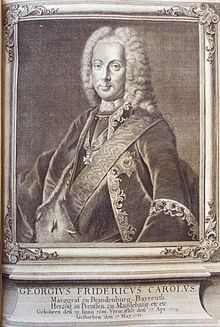George Frederick Charles, Margrave of Brandenburg-Bayreuth
| George Frederick Charles, Margrave of Brandenburg-Bayreuth | |
|---|---|
 |
|
| Spouse(s) | Dorothea of Schleswig-Holstein-Sonderburg-Beck |
| Noble family | House of Hohenzollern |
| Father | Christian Heinrich of Brandenburg-Bayreuth-Kulmbach |
| Mother | Sophie Christiane of Wolfstein |
| Born |
30 June 1688 Oberzulzbürg Castle (near Mühlhausen) |
| Died | 17 May 1735 (aged 46) Bayreuth |
George Frederick Charles, Margrave of Brandenburg-Bayreuth (30 June 1688 at Oberzulzbürg Castle, near Mühlhausen – 17 May 1735 in Bayreuth), was a German prince, member of the House of Hohenzollern, nominal Margrave of Brandenburg-Bayreuth-Kulmbach (1708–35) and Margrave of Brandenburg-Bayreuth (1726–35).
He was the eldest of the fourteen children born to Margrave Christian Heinrich of Brandenburg-Bayreuth-Kulmbach by his wife, Countess Sophie Christiane of Wolfstein. Besides him, only six of his siblings survived childhood: Albrecht Wolfgang, killed in battle in 1734; Dorothea Charlotte, Countess of Hohenlohe-Weikersheim, who died in 1712 after only seven months of marriage; Sophie Magdalene, Queen of Denmark; Frederick Ernst; Sophie Caroline, Princess of Ostfriesland; and Frederick Christian, who later inherited the margraviate of Bayreuth.
During his early years, George Frederick Charles was instructed by his very religious mother, and later received a careful formal education in Bielefeld. From 1700 to 1704 he travelled to western Europe as part of a traditional educational journey (Grand Tour), and visited, among other countries, Denmark, France and the Dutch Republic. Later, he studied four years at the University of Utrecht. After the death of his father in 1708 he returned with his family, who had lived since 1704 in the Schloss Weferlingen near Magdeburg, and assumed the nominal title of Margrave of Brandenburg-Bayreuth-Kulmbach.
Schloss Weferlingen had been assigned to his family as an appanage by King Frederick I of Prussia, after George Frederick Charles's heavily indebted father had renounced his succession rights to the Franconian Hohenzollern estates of Bayreuth and Ansbach in favour of Prussia in the Contract of Schönberg. George Frederick Charles nonetheless tried to recover his rights after the death of his father and sought the abolition of this contract. He was able to secure the support of the Franconian states, who feared being merged into the Franconian Circle by Prussia. George Frederick Charles could also rely on the decisive assistance of the Archbishop of Mainz and Prince-Bishop of Bamberger Lothar Franz von Schönborn and his nephew, the Imperial Vice-Chancellor (German: Reichsvizekanzler) Frederick Karl von Schönborn, who supported the abolition of the Contract of Schönberg. His efforts finally succeeded only in 1722 after long and difficult discussions and the payment of a substantial indemnity to Prussia.
...
Wikipedia
